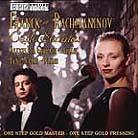November 1998
Dual national influences are evident in both French and Russian music of the late Romantic era. In the mid 19th century, breaking free of the German influence that had been prevalent for more than a hundred years before, CÚsar Franck reached beyond the profound influence of Wagner and Schubert to create a musical vocabulary that would influence the next generation of French composers, including Debussy and Saint-SaŰns. Later in the 19th century, the aggressive nationalist movement of Borodin, Mussorgsky and Rimsky-Korsakov passed on a thoroughly Russian musical vocabulary to Sergei Rachmaninov. But Rachmaninov also felt the influence of Wagner as well as the new currents in France. Two wonderful examples of musical cross pollination have been recorded by cellist Alexis Pia Gerlach and pianist Fabio Bidini on the Encore label. Ms. Gerlach, a young cellist only two years removed from Juilliard, is a fine musician in her formative years. She tackles two impressive pieces on this recording, Franck’s Violin Sonata in A Major (transcribed for cello and piano) and the Rachmaninov Sonata in G Minor, Op. 19, and performs them with youthful exuberance. She plays the Frank with a great deal of sensitivity, keeping the numerous short phrases interesting, but her intensity seems to wane during quieter sections. With a few years of maturing and steady concertising, she has the potential to become a very capable soloist. Mr. Bidini plays robustly and forcefully, but perhaps too aggressively during sections marked forte. The cello has trouble peeking through the wall of sound he creates. The Franck Sonata demands a synergy of two musicians, both with taxing parts to play. The piano is more dynamic than a typical accompaniment, and there are passages where the cello assumes the role of musical conscience -- it reminds the listener of the thematic material before it is developed beyond recognition by the piano. Few composers test an artist’s conviction as much as Franck. Ms. Gerlach’s and Mr. Bidini’s performance evokes the type of sonority that the music of the father of French Impressionism deserves, and their tone intensifies during the adventurous peaks and valleys more often associated with the German romantic sound. In the stunning Rachmaninov Sonata, both artists are more successful at expressing emotion and style. The pastoral opening of the first movement sounds truly French, but as the theme is repeated, the color changes immediately. The listener is aware that this simple statement already has Russian and German as well as Romantic and post-Romantic connotations. The following whirlwind of changing moods is skillfully handled by both players. Mr. Bidini’s long and luxurious phrasing is one of the masterful touches on this recording. Ms. Gerlach plays with intensity, but with a very tight vibrato. At times during the quieter and more melodic passages I wished she had chosen a slightly warmer sound. Producer and engineer Ron Meyer bypassed the electronics that commonly degrade the quality of digital recordings, and it shows. His recording has a depth and warmth frequently missing from CDs. He eschewed the recording studio for the ambient confines of a small theater. Unfortunately, only two microphones, placed ten feet from the performers, were used in an attempt to record the music exactly as the audience would have heard it. Because of this choice, the piano sometimes has too much resonance in the lower frequencies, often covering the warmth of Ms. Gerlach’s wonderful-sounding instrument. At other times, swift piano articulation was lost in the ambiance of the room. More microphones with different placement around the theater might have provided a more realistic live-recital sound. Filling the theater with an audience might have helped too. The acoustics on this recording sound more like those in an empty room than from a recital-hall performance. Because these pieces are rarely heard by audiences other than chamber-music devotees, the liner notes for this CD should give more information about the composers, their times and their influences. The liner notes fail to mention that Franck is considered the founder of modern French chamber music and drew inspiration in the song cycles of Schubert (a fact that would greatly enhance the appreciation of the final movement). Rachmaninov is identified as "one of history’s most prodigious pianists" with a "very busy career," but there’s nothing about where or when. Significantly, especially to this recording, he enjoyed great success in Paris where he rubbed elbows with some of history’s great composers -- especially the French ones. Despite some flaws, this is an interesting CD of two young performers from whom we will certainly hear more. Ms. Gerlach should find her voice in a few years, and I look forward to Mr. Bidini’s next recordings. GO BACK TO: |
 Franck - Rachmaninov - Cello Sonatas
Franck - Rachmaninov - Cello Sonatas ![[Reviewed on Gold CD]](../format/goldcd.gif) Conflicts
of differing nationalistic styles, often at odds with each other, make difficult choices
for performers. How do the performers tip their respective hats to Wagner in a piece that
is pioneering French Impressionism? How do they interrupt a dark and muscular Russian
sound with French "light" and simplicity?
Conflicts
of differing nationalistic styles, often at odds with each other, make difficult choices
for performers. How do the performers tip their respective hats to Wagner in a piece that
is pioneering French Impressionism? How do they interrupt a dark and muscular Russian
sound with French "light" and simplicity?